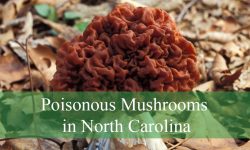Creating a vibrant garden is a joyous endeavor, and planning it can be just as delightful! If you’re aiming to feature a diverse range of flowers, consider incorporating the beauty of the alphabet.
Here’s a curated list of 65 exquisite flowers that start with C. From the enchanting Chinese Lantern to the radiant Chrysanthemum, and the graceful Clematis to the charming Cornflower, these flowers add a touch of elegance and variety to your garden.
Explore the wonders of nature as you bring this alphabetical floral symphony to life in your flowerbeds!
Different Types of Flowers that Start with C
Catmint
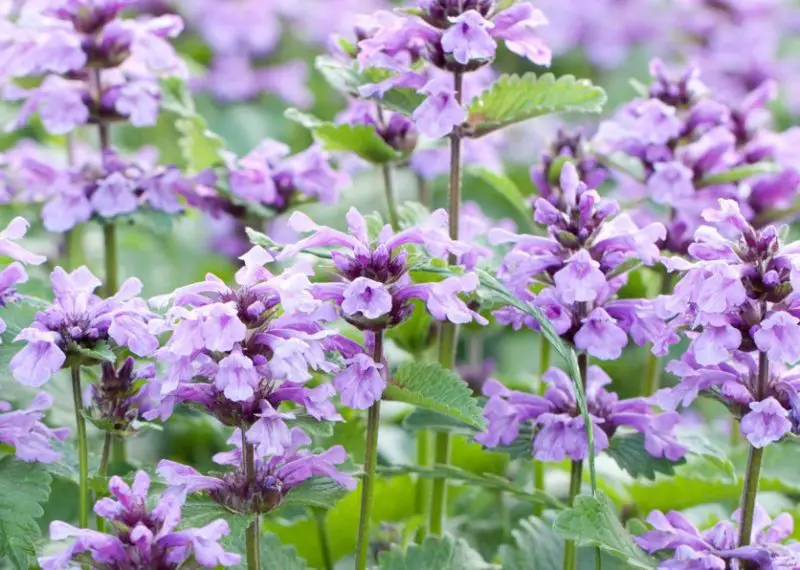
Nepeta spp. are herbaceous, blooming perennials native to Europe, northern Africa, and Asia that are generally referred to as catmint or catnip. These C-starting flowers are well-known for their eye-catching spikes of bluish-purple blossoms that attract hummingbirds, butterflies, moths, and bees. They bloom from late spring to early fall. Among the genus, Nepeta cataria is particularly interesting because of its interesting behavioral effects that attract cats, both indoor and outdoor.
Cattleya Orchids
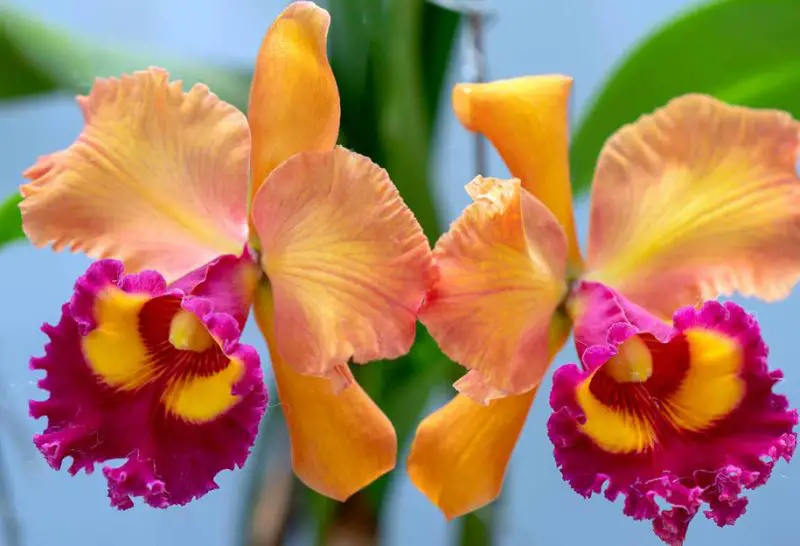
North and central South America are home to the 130 recognized species of orchids known as Cattleya spp. The shape of the leaves and the quantity of flowers on a single raceme vary greatly throughout these epiphytic and terrestrial orchids, spanning multiple subgenera. The most distinctive feature of Cattleya orchids are their starfish-shaped flowers, which have a central labellum that is broader and has a different color from the other five petals.
Centaury
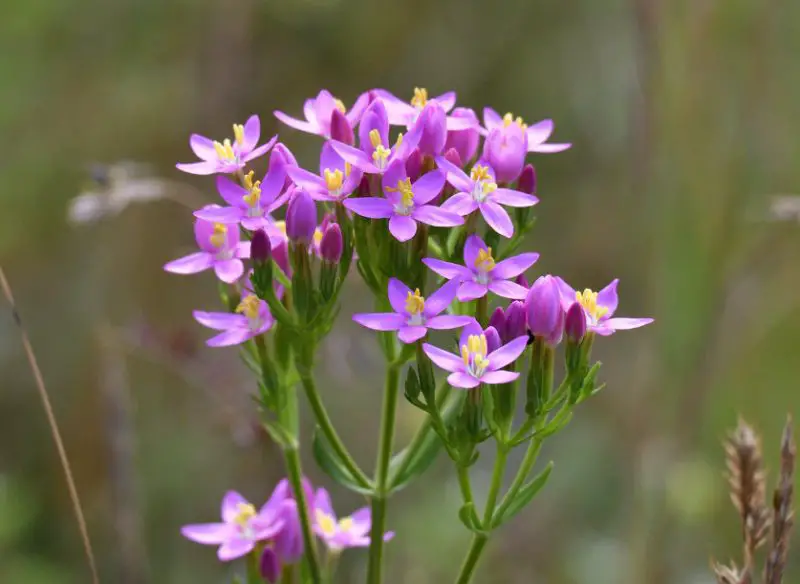
From late spring to late summer, Centaurium erythraea, also referred to as Centaury, adorns gardens with its captivating beauty. This pretty herb has tall, erect stems that occasionally branch out, and tiny rosettes of leaves. Large inflorescences of rose-pink flowers bloom from deep-pink buds atop the stems.
Cherry Blossom
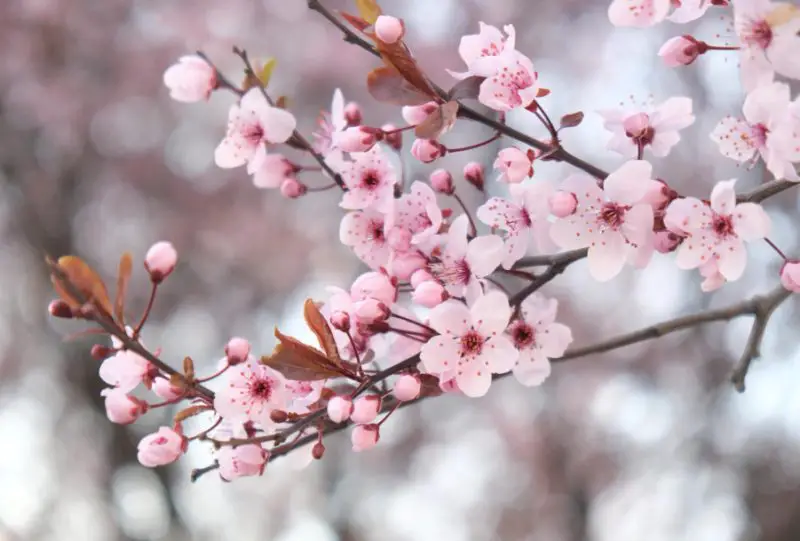
338 different species of trees and shrubs in the genus Prunus originate in the tropics of Africa, Asia, South America, and temperate North America. Cherry blossoms are particularly significant among them as they are emblematic of springtime, rebirth, and rejuvenation. White cherry blossoms represent deceit, but these blooms, which are celebrated globally in springtime cherry blossom festivals, capture the spirit of a quality education through the language of flowers.
Chinese Forget-Me-Note
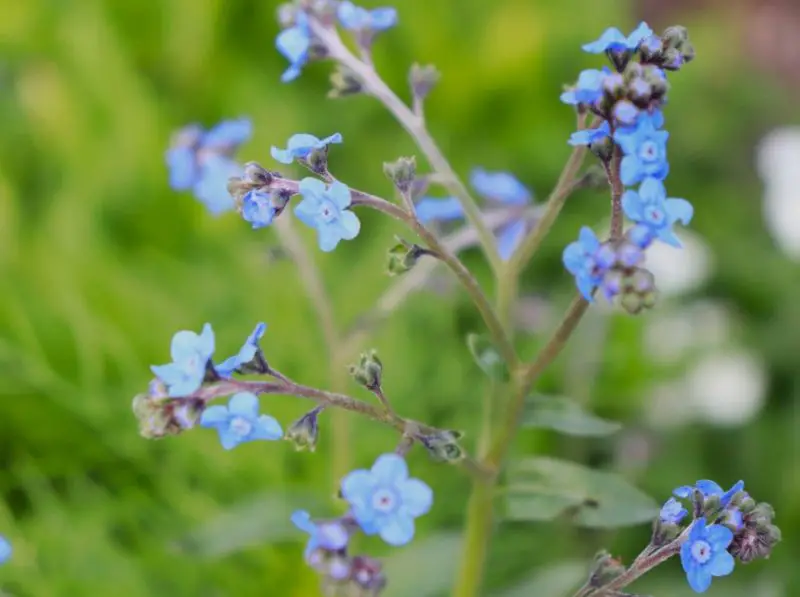
Native to China, Nepal, Tibet, and Thailand, Cynoglossum amabile, also called the Chinese Forget-Me-Not, thrives from late spring to late fall. It is grown as an annual in cooler areas, although it functions as a perennial in USDA hardiness zones six through nine. Growing to a height of one to two feet, it bears attractive racemes of small, dusky-blue, five-petaled flowers together with silvery-green foliage.
Chinese Hibiscus
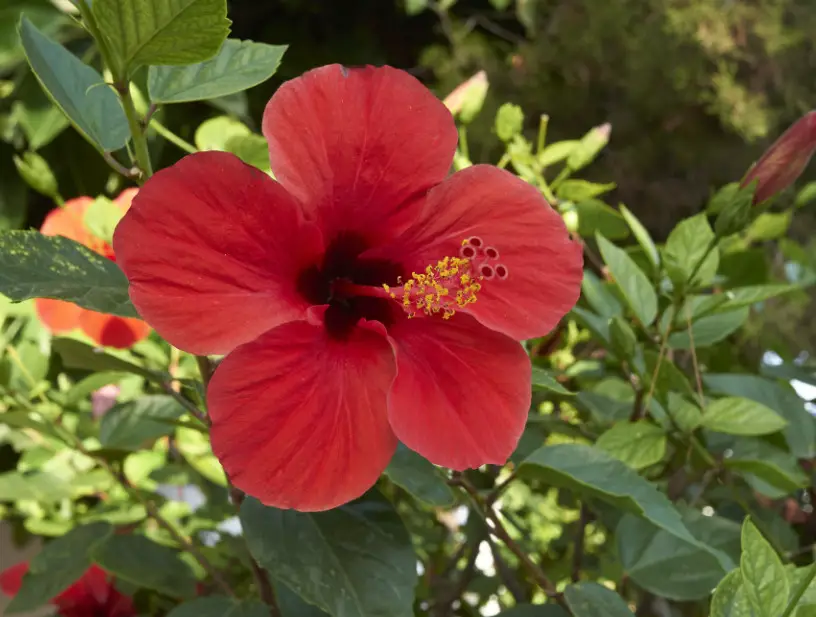
Vanuatu is the native home of Hibiscus rosa-sinensis, also referred to as Chinese hibiscus, which blooms from spring until late summer. It’s also known as the shoeblack plant, rose mallow, China rose, tropical hibiscus, Hawaiian hibiscus, and rose hibiscus. With its four-inch crimson blossoms that have nearly black centers and a central stamen sprinkled with golden yellow, it represents exquisite beauty in the language of flowers.
Chinese Lantern
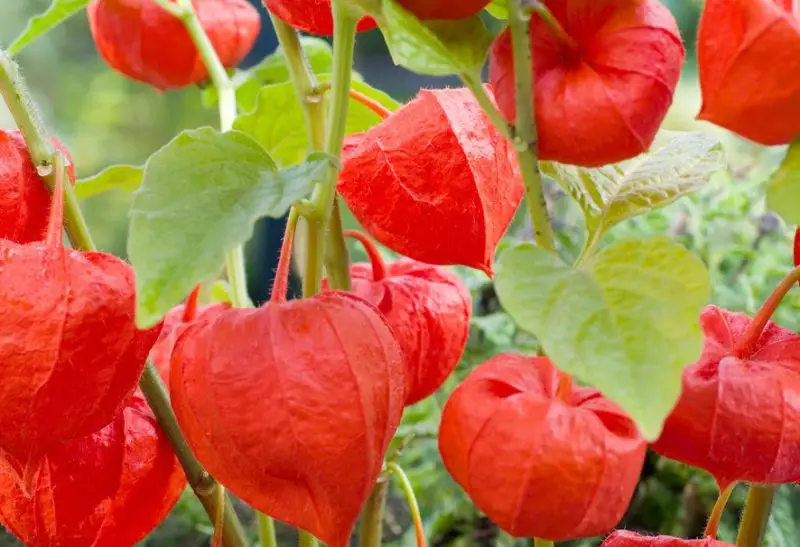
Alkekengi officinarum, the scientific name for Chinese lantern, is native to temperate Asia and Europe. It is a member of the Solanaceae family and blooms from late summer to early October. Like other nightshades, the plant’s rest is poisonous, but the fruits are edible. The plant, which has tiny white flowers, is well-known for its unusual seed pods, which resemble red paper lanterns.
Chocolate Cosmos
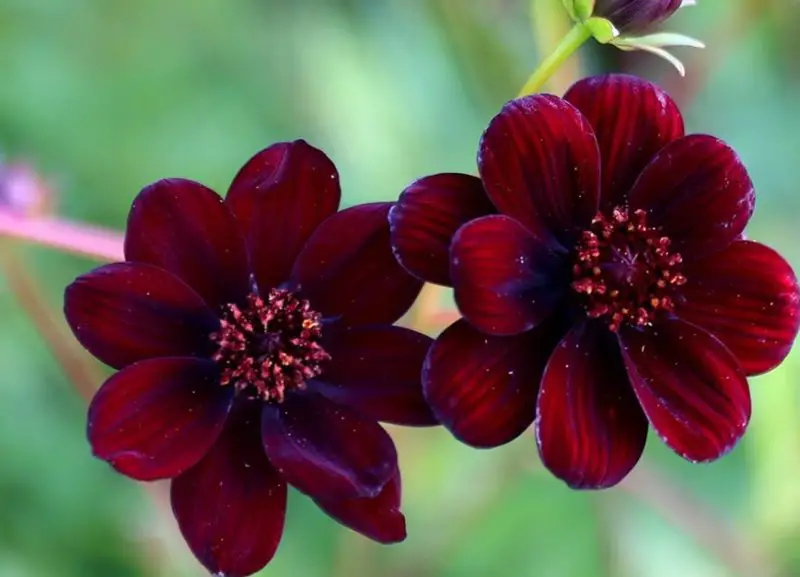
Mexican-born Chocolate Cosmos, or Cosmos atrosanguineus as it is formally called, blooms from early summer to fall. This unusual flower has almost chocolate-colored maroon petals and a strong cocoa scent. Chocolate Cosmos, like all Cosmos flowers, is a symbol of luxury and balance as well as harmony.
Chocolate Lily
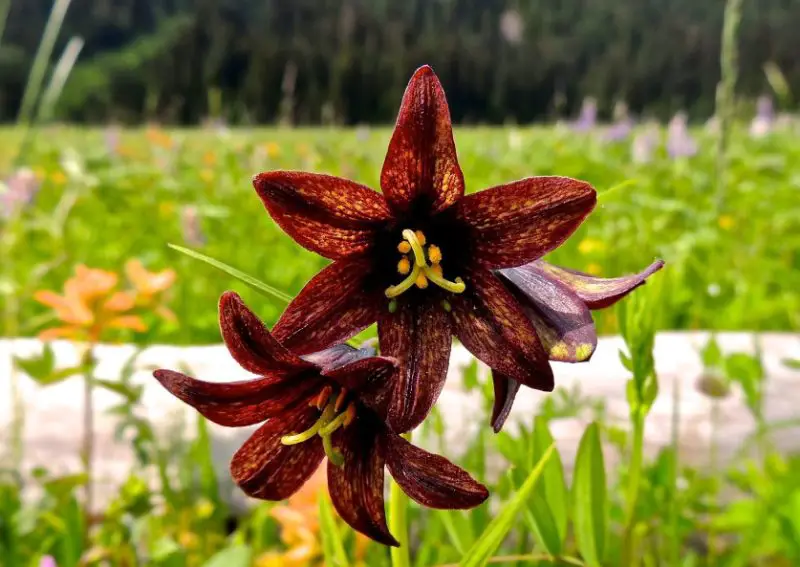
Fritillaria camschatcensis, the scientific name for the chocolate lily, is a plant that grows well in northeastern Asia and Northwestern North America. It blooms from late spring to June. This striking perennial has eight trumpet-shaped, dark brownish-purple flowers that bloom with lustrous, sword-shaped leaves. The petals may have stripes or dots of golden yellow color that complement the stamens of the flower.
Christmas Cactus
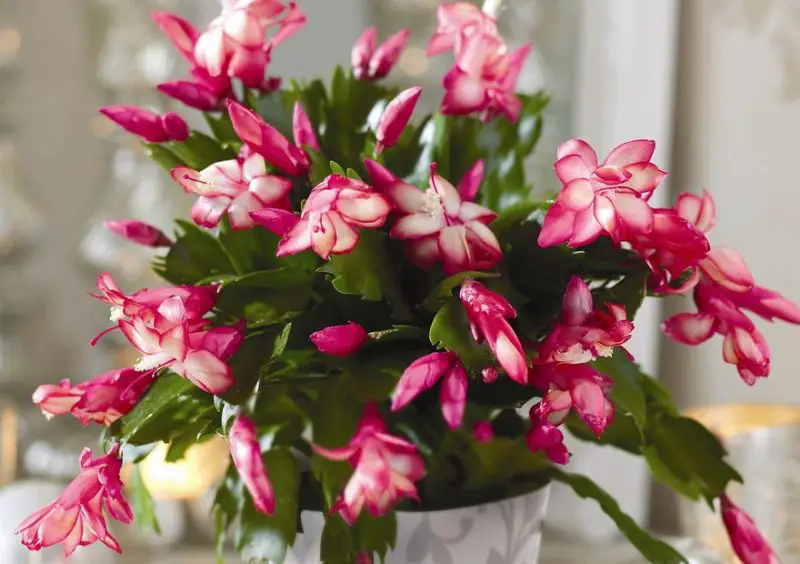
Schlumbergera spp., the scientific name for Christmas cactus, is native to southeast Brazil and blooms from late fall to mid-winter. The Christmas cactus, Thanksgiving cactus, holiday cactus, and crab cactus are only a few of the seven species that make up the Schlumbergera genus. These prickly, epiphytic cactus get their festive names from their profusion of blossoms during the Christmas season, which include elaborate tubular flowers in shades of white, pink, and red.
Chrysanthemum
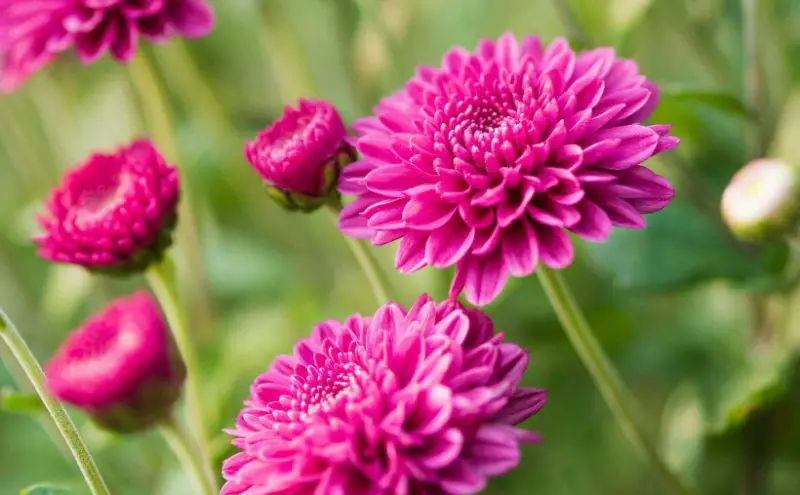
Known by its scientific name, Chrysanthemum spp., the plant is indigenous to northern North America, northeastern Europe, and Eastern Asia. The 36 recognized species of the genus, which blooms from late summer to early winter, feature a wide range of cultivars and hybrids that differ in size, color, shape, and texture of the petals.
Cineraria
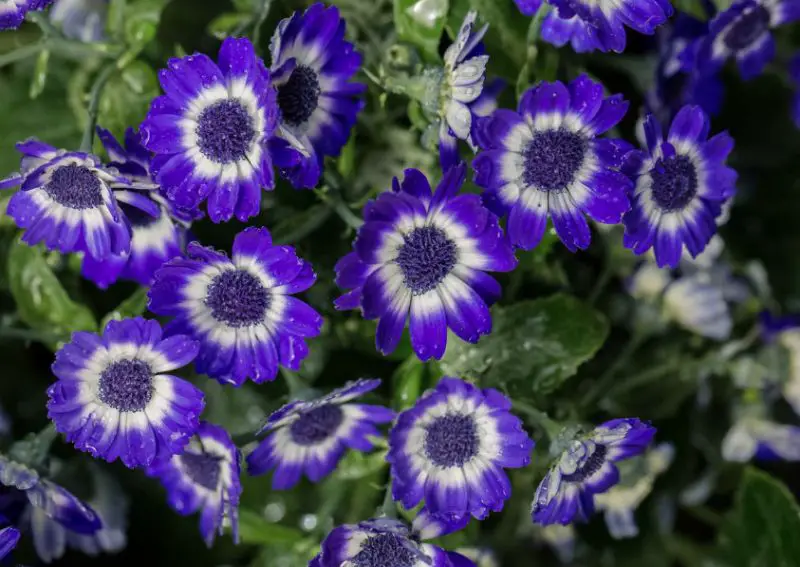
African and Arabian Peninsula natives, Cineraria (scientifically named Pericallis x hybrida) blooms from mid-winter to early spring. These C-starting flowers, a hybrid of Pericallis lanata and Pericallis cruenta, with plenty of bunches in the middle of colorful foliage. Cineraria is a perennial plant that has daisy-shaped blooms in a variety of hues and bicolor combinations, including white, pink, purple, red, and blue.
Calendula
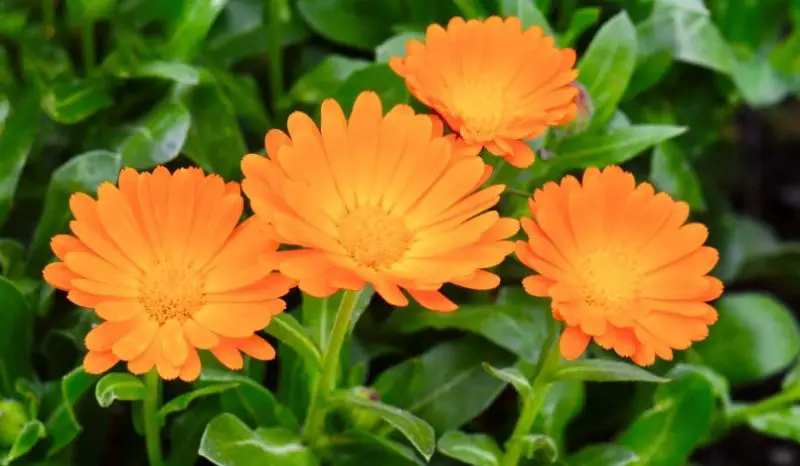
Calendula officinalis, commonly known as common marigold or pot marigold, boasts a stunning golden hue. Native to Spain, it thrives from spring to fall in cooler climates and vice versa in warmer regions. Beyond its aesthetic appeal, these C-starting flowers serve as effective insect repellents in gardens.
Calla Lily
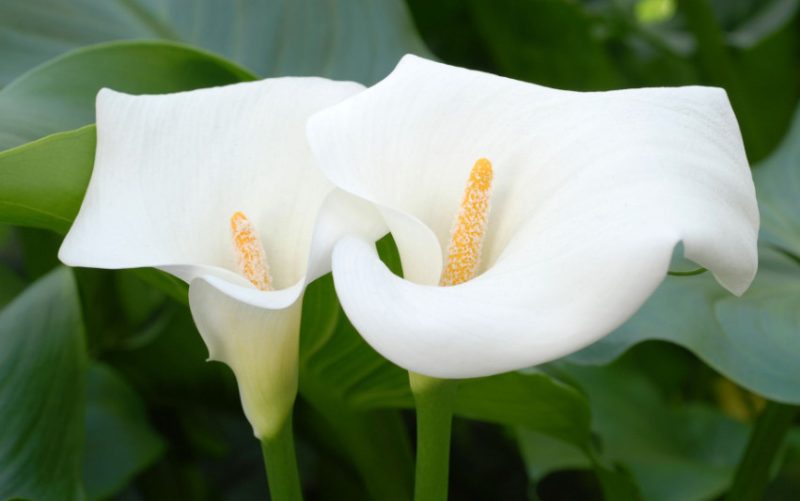
The Southern African calla lily, Zantedeschia aethiopica, is a magnificent plant that blooms from late spring to early summer. It’s not a genuine lily, but its thin shapes and vivid colors—yellow, orange, pink, purple, red, and black—make it captivating none the less. In addition to being aesthetically pleasing, calla lilies have symbolic meaning; in the language of flowers, they stand for glorious beauty.
Camas
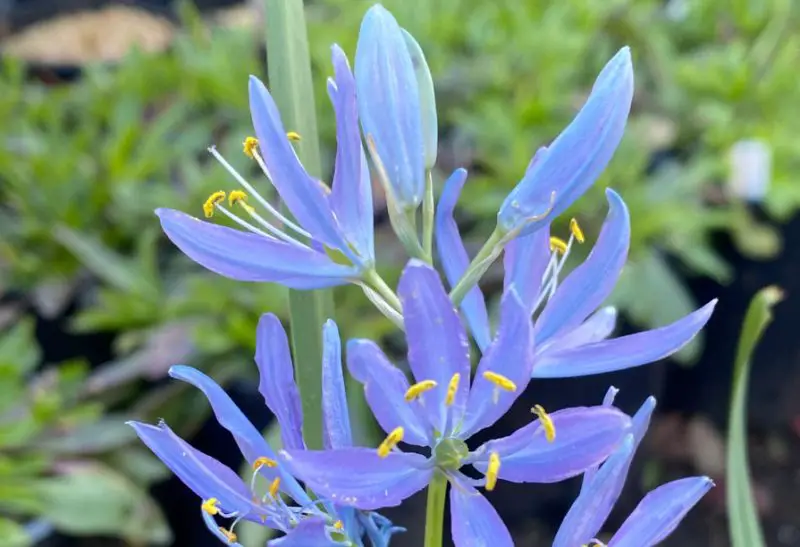
Six different kinds of camassia are native to North America and grace landscapes from late spring to summer. These vivid flowers, also called camas, camash, quamash, Indian hyacinth, and wild hyacinth, adorn vast grasslands and meadows, turning drab surroundings into a breathtaking sea of waving blue and purple. Besides, camas’ silvery-green stems and foliage have historical significance as a vital source of sustenance for Native Americans.
Camellia
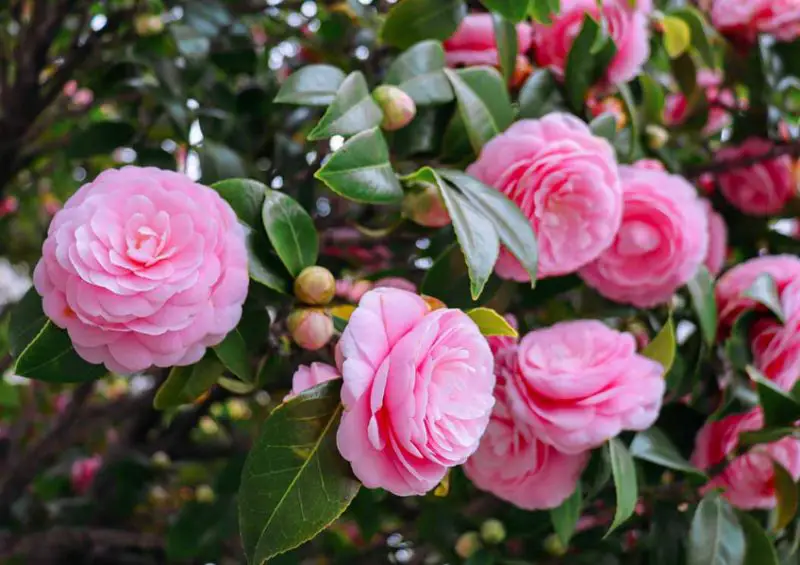
Southern and eastern Asia’s tropical and subtropical climates are home to the 230 flowering shrubs and small trees in the genus Camellia, which is part of the tea plant family. These fascinating flowers, which bloom in shades of white, pink, and red from late fall to mid-spring, with some types having yellow blooms, have symbolic meanings according to the language of flowers.
Candytuft
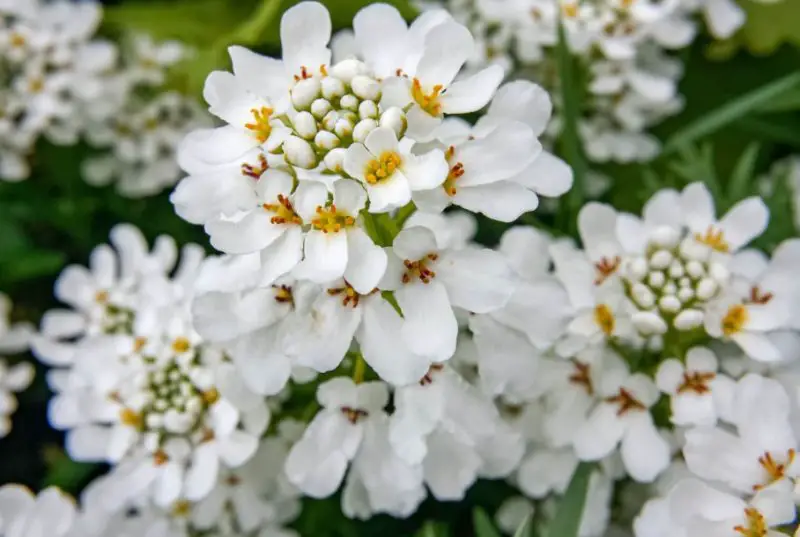
Candytuft, or Iberis sempervirens, is a woody perennial subshrub that grows from late spring to July and is endemic to Southern Europe, Algeria, and Morocco. With flat corymbs of white, purple, or pink flowers and emerald-green foliage, it makes a pretty ground cover that draws butterflies.
Canterbury Bells
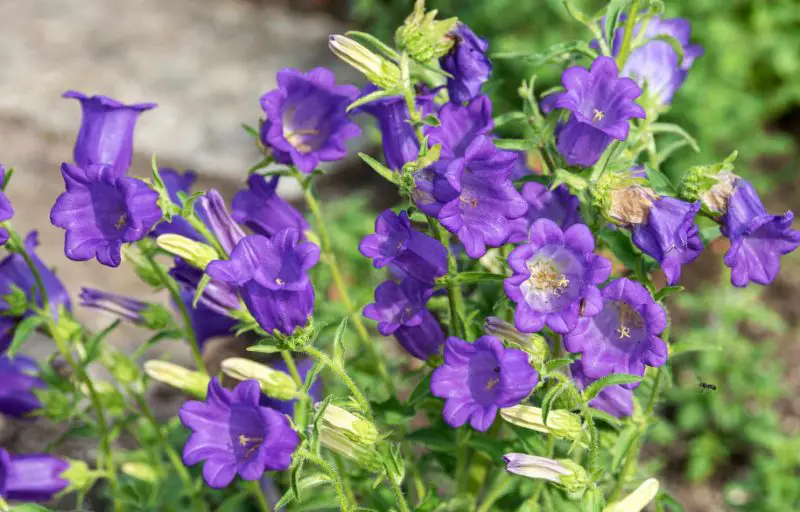
Originating in Italy and France, campanula medium, also known as Canterbury Bells, add beauty to gardens from mid-spring to early summer. These gorgeous, almost three-foot-tall plants have hairy, woody stems and rosettes of lush foliage. Racemes are adorned with their exquisite bell-shaped blooms, which come in colors of violet-blue, purple, and occasionally white. They bloom for two years as biennials, and then their life cycle ends.
Cape Primrose
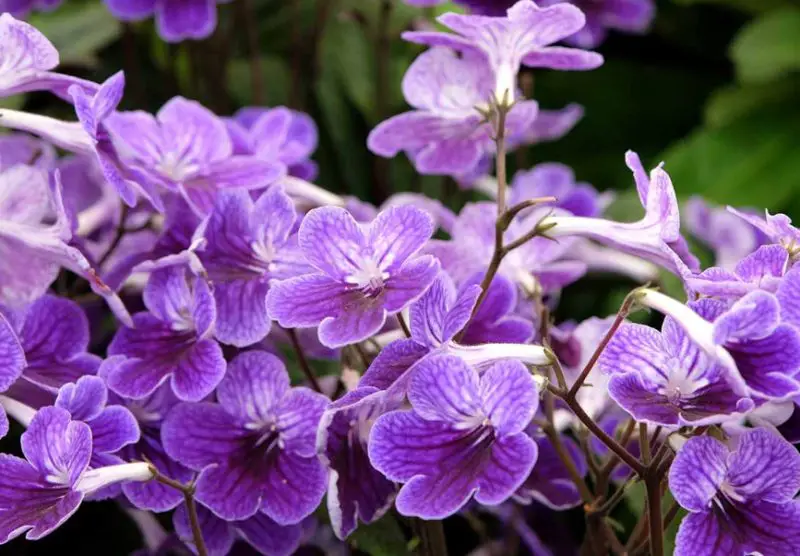
Streptocarpus spp., sometimes referred to as streps or Cape primrose, are native to South Africa and are beautiful all year round. The genus and subgenus of these flowers are indicated by the term “Streptocarpus”. Like Primula genus primroses, these plants have a basal rosette of lanceolate foliage and have classically formed flowers on long, thin stalks in a variety of colors, including pink, purple, blue, yellow, white, and bicolor combinations.
Cardinal Flower
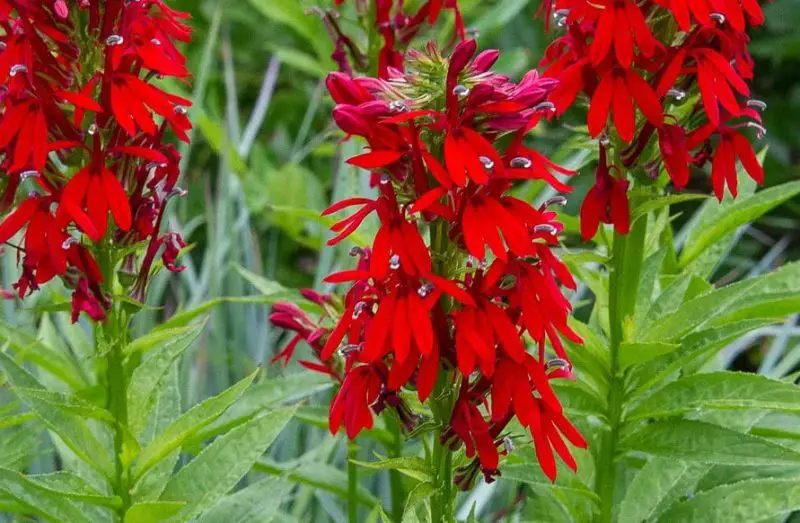
Known by most as Cardinal Flower, Lobelia cardinalis is found in Mexico, Central America, northeastern Colombia, southeast Canada, and the southwestern and eastern United States. This beautiful scarlet-colored flower, which blooms from June to early fall, has blossoms popping from erect spikes. Every flower has two upper petals and three lower petals that join in the center to form a tube.
Carnation
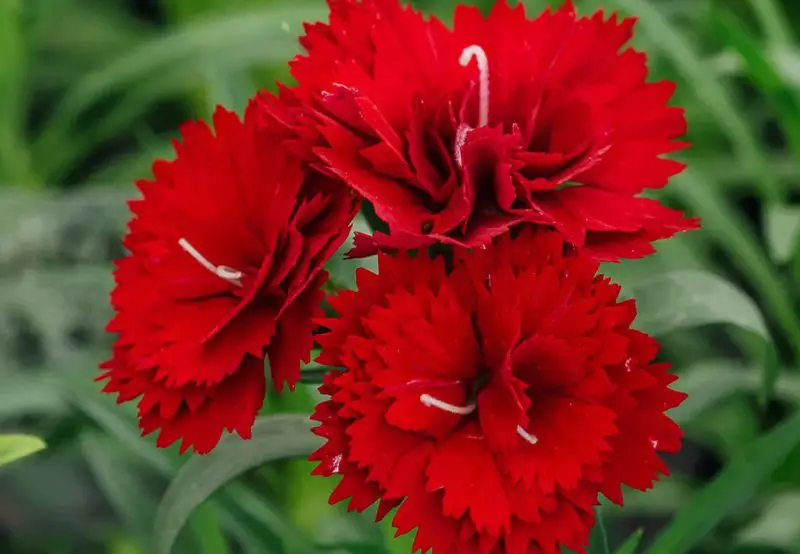
Carnation, or Dianthus caryophyllus, is thought to have come from the Mediterranean region. These commercial favorites, with their lavishly ruffled petals, bloom from late spring to early fall and are a common sight in floral creations.
Cat’s Ear
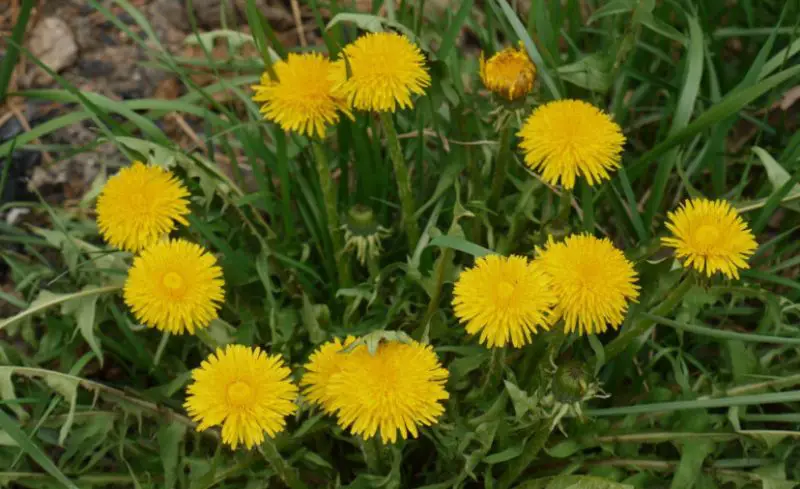
Originating in Europe and northern Africa, Hypochaeris radicata is also called Cat’s Ear or false dandelion. It blooms from June to early October. This edible herb, sometimes known as flatweed, works well in salads, steamed food, or eaten raw. From a central taproot, the plant produces a rosette of lance-shaped, toothed leaf. Its golden-yellow flowers, which are similar to flat pom-poms, sprout from long, thin stems that resemble real dandelions.
Clarkia
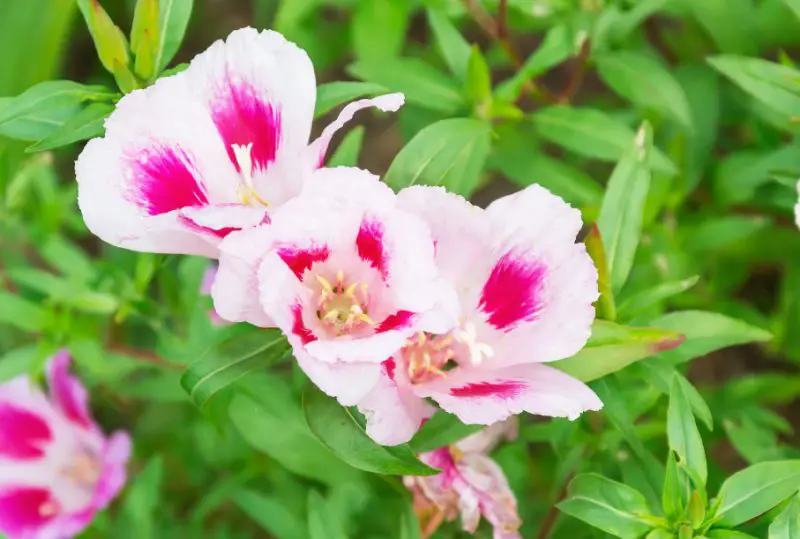
Native to Western North America and southern South America, the species of Clarkia, technically known as Clarkia spp., blooms in the summer and fall. This genus has 42 recognized species, most of which are annual herbs in the family Onagraceae (evening primrose). Red, pink, or white hues can be seen in the four sepals and petals that characterize clematis blossoms.
These flowers, which are produced in tall racemes, vary somewhat in form and shape within the genus; one of the variants is the cup-shaped blooms.
Clematis
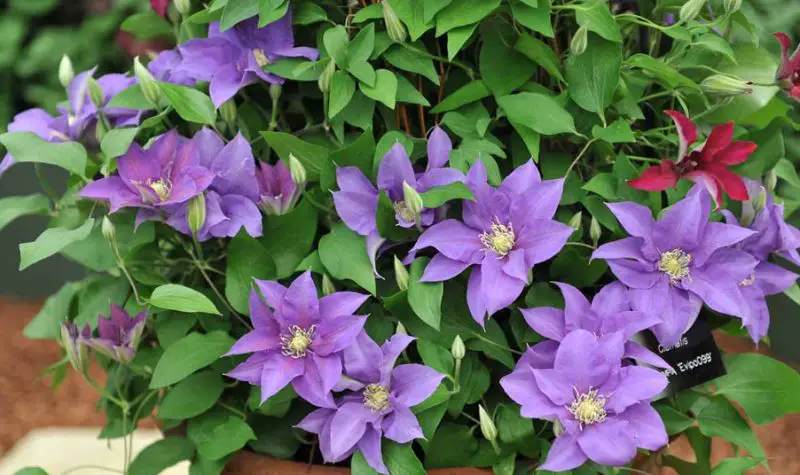
The adaptable flowering plant clematis, technically known as Clematis spp., is found almost everywhere (with the exception of most of the Arctic and Antarctic regions). Mostly woody vines, the genus has 386 recognized species and is a member of the Ranunculaceae (buttercup) family. There are also several hybrids and cultivars within the genus. The colors of clematis blossoms are varied, with single and double forms appearing in a range of red, pink, purple, blue, yellow, and white hues.
Climbing Snapdragon
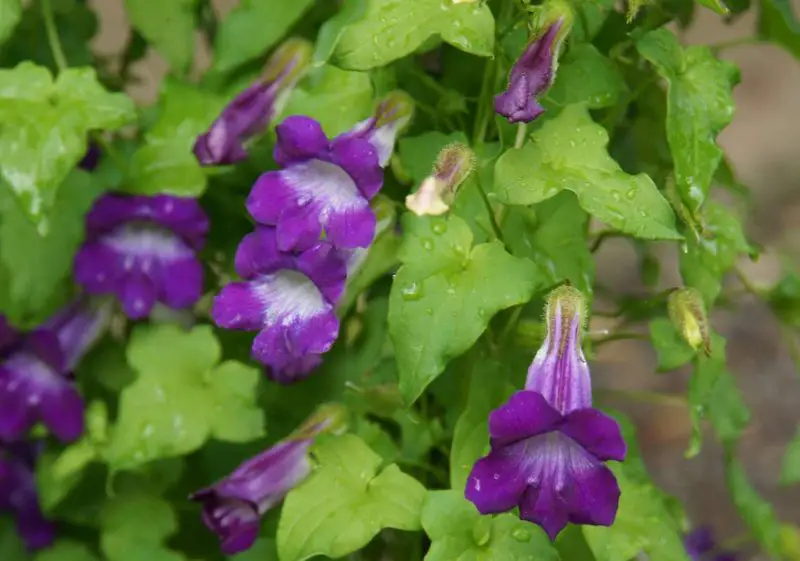
Originating in Mexico and Central America, the scientific name for the Climbing Snapdragon is Asarina scandens, sometimes known as Maurandya scandens. It blooms during the summer. Although it is not the same as the common garden snapdragon, its tubular, somewhat trumpet-shaped flowers have a similar appearance. These violet, lavender, blue, pink, and white-hued flowers are produced by a trellis-friendly shrub along leafy vines.
Clover
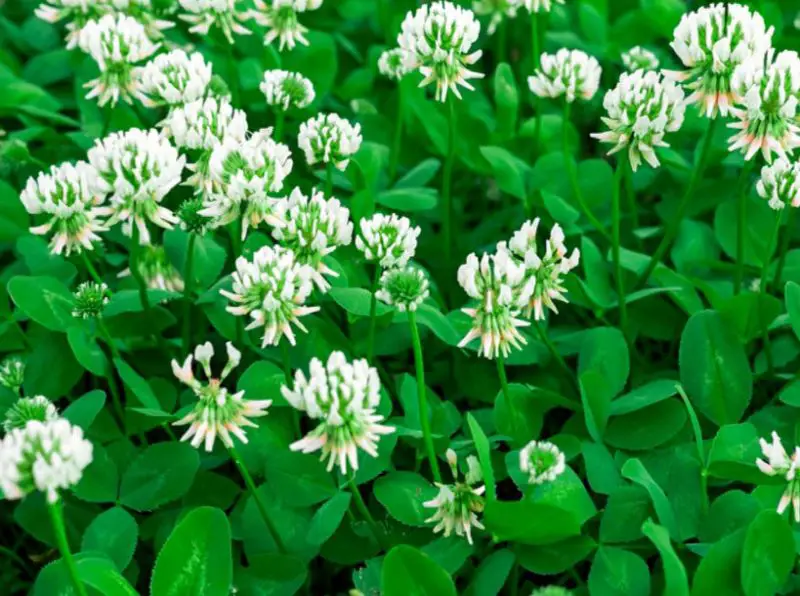
Trifolium spp., the scientific name for clover, is a plant that belongs to the Fabaceae family, which includes peas. It may be found throughout most of Asia, Africa, Europe, North America, and South America. Commonly referred to as trefoil or clover, the genus comprises 291 recognized species that bloom from April to November. With bulbous flower heads in shades of white, pink, and red, these flowering plants make a charming ground cover that is good for pollinators.
Cobra Lily
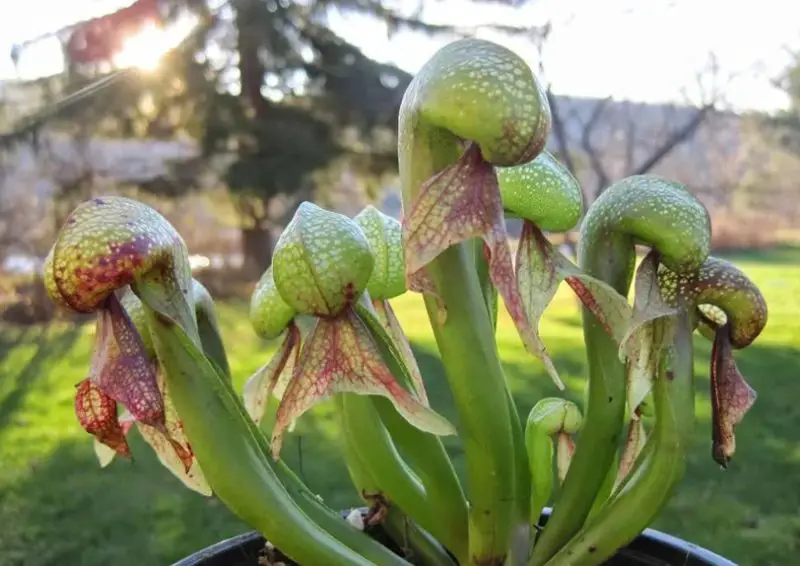
Darlingtonia californica, commonly referred to as cobra lily in science, is a spring-flowering carnivorous pitcher plant native to Oregon and California. It has tubular leaves that resemble the tongue of a yellow or purplish-green snake, and a front-facing forked leaf that resembles a rearing cobra. Since cobra lilies need particular circumstances to survive, growing them indoors or in climates that differ greatly from their native habitats can be difficult.
Cockscomb
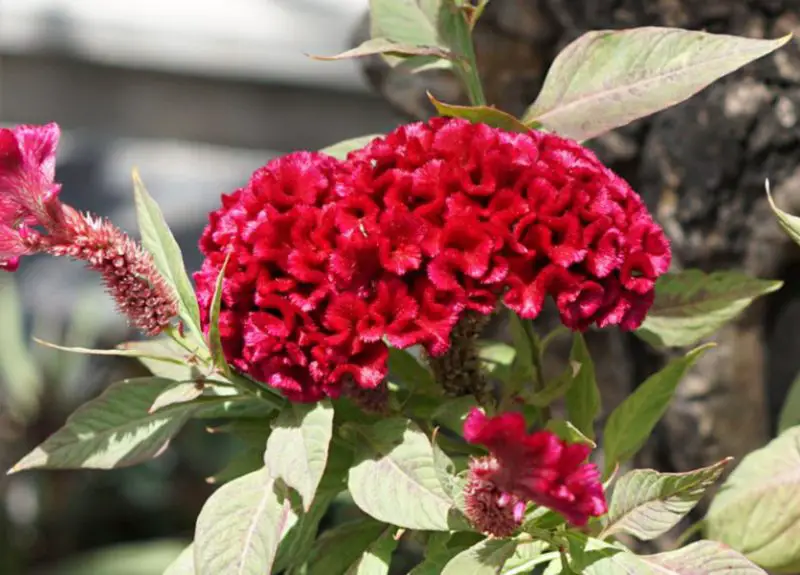
Celosia spp., the scientific name for cockscomb, is native to Central Africa and blooms from mid-spring to fall. As a member of the Amaranthaceae (amaranth) family, the 46 recognized species that make up the Celosia genus are also known as cockscombs. Their inflorescences grow abnormally, a phenomenon called fasciation or cresting, which gives them uneven textures and shapes. Vibrantly colored in shades of pink, yellow, and red, the flowers resemble rooster crests and are shaped like spikes.
Columbine
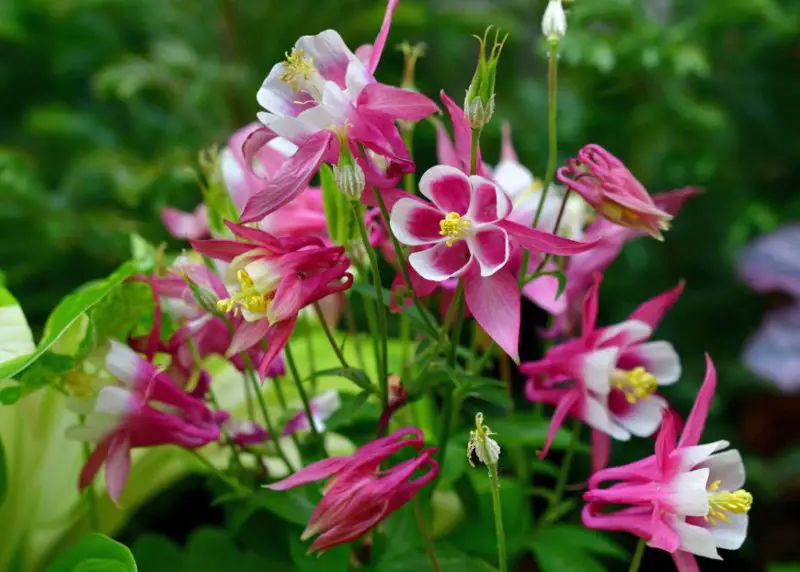
The plant family Ranunculaceae, which includes columbine (Aquilegia spp.), is native to the Northern Hemisphere and blooms from spring to early summer. Known by most as granny’s bonnet or columbines, the Aquilegia genus has 130 recognized species. These flowers are identified by the attractive, frequently clashing hues and spurred trumpet shapes that they have.
Crocus
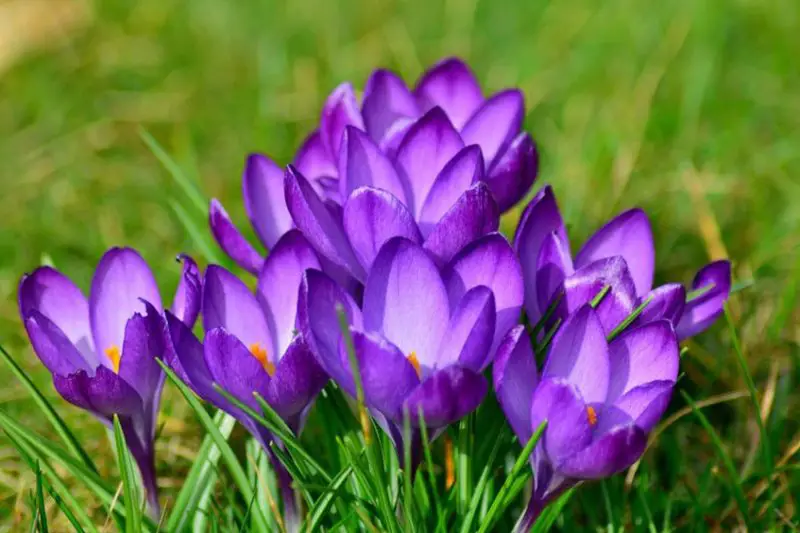
The plant genus Crocus, technically designated Crocus spp., is a member of the Iris family, which includes 261 species of early-blooming flowers. Crocuses bloom from late winter to early spring and are native to Europe, northern Africa, and western and central Asia. They are only a few inches tall, growing near to the ground with lance-shaped leaves and cup-shaped blooms. These C-starting flowers are frequently gradient-hued and come in purple, blue, yellow, orange, pink, or white.
Crown Imperial
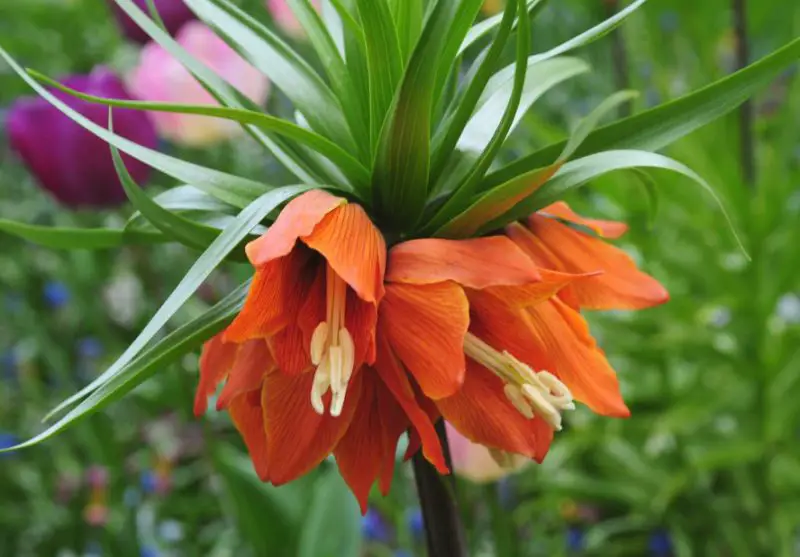
Known by many as the crown imperial, fritillaria imperialis is a spectacular spring-blooming plant endemic to Turkey, Iraq, Iran, Afghanistan, Pakistan, and the western Himalayas. This massive plant, which may grow up to four feet tall, has enormous clusters of twisted-looking lance-shaped leaves with wavy edges. Tall stems with yellow bottoms and green tips that resemble spiky pineapples grow from the heart of the foliage. These stalks are crowned with tufts of leaf-like bracts. Though they are visually pleasing, the blossoms smell like skunks.
Crown of Thorns
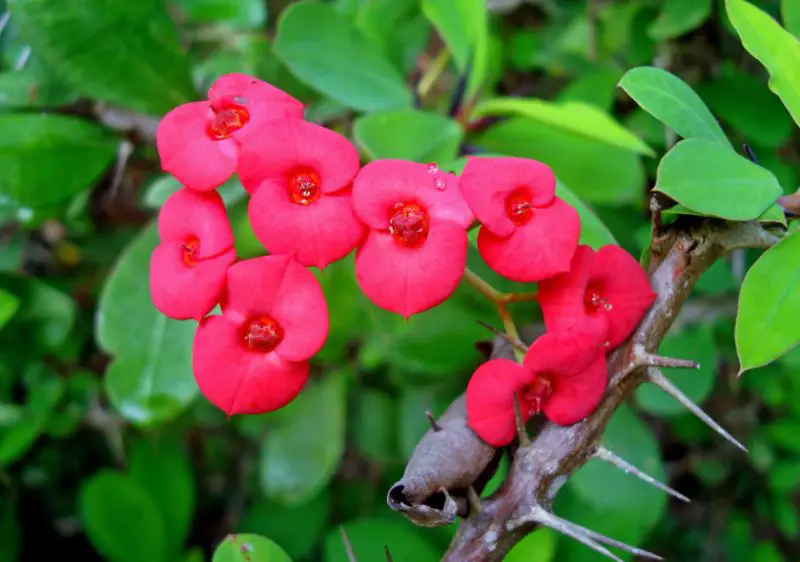
Euphorbia milii, also called Christ thorn, crown of thorns, or Christ plant, is a spring and summer-flowering plant native to Madagascar. It is a plant that belongs to the Euphorbiaceae family, which includes purging plants. It has thorny stems that are strong and can reach a height of nearly six feet.
Because of its prickly characteristics, the plant is associated with the crown of thorns that Christ wore during the Passion. These C-starting flowers bear rows of blood-red, rose, or white flowers with a characteristic whorled petal arrangement, as well as rosettes of succulent, green leaves.
Cuckoo Flower
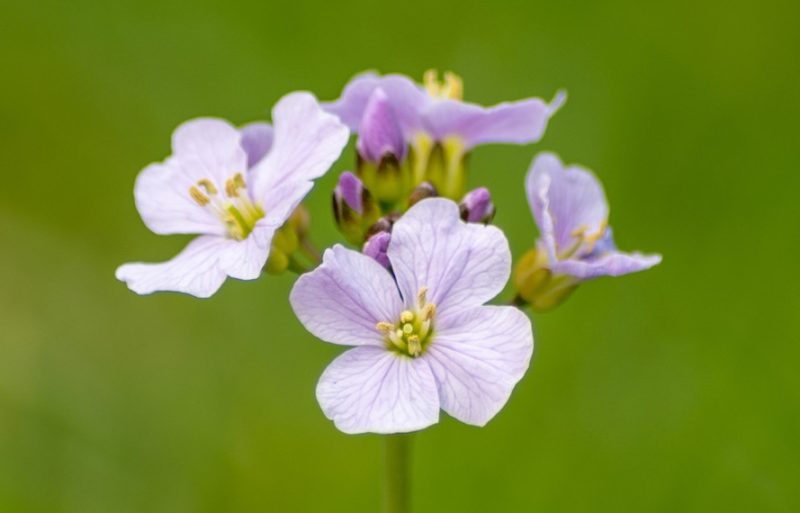
Cardamine pratensis is a member of the Brassicaceae (mustard) plant family, and is sometimes referred to as cuckoo flower, milkmaid, mayflower, or lady’s smock. It blooms in the spring and is native to northeastern North America, Europe, and Asia. The cuckoo plant is symbolic of ardor or passion in floral language. It has clusters of small, usually light pink but sometimes white, flowers from loose, clumps of grass-like foliage. These plants love water, thus they do best in damp conditions with inadequate drainage.
Cup and Saucer Vine
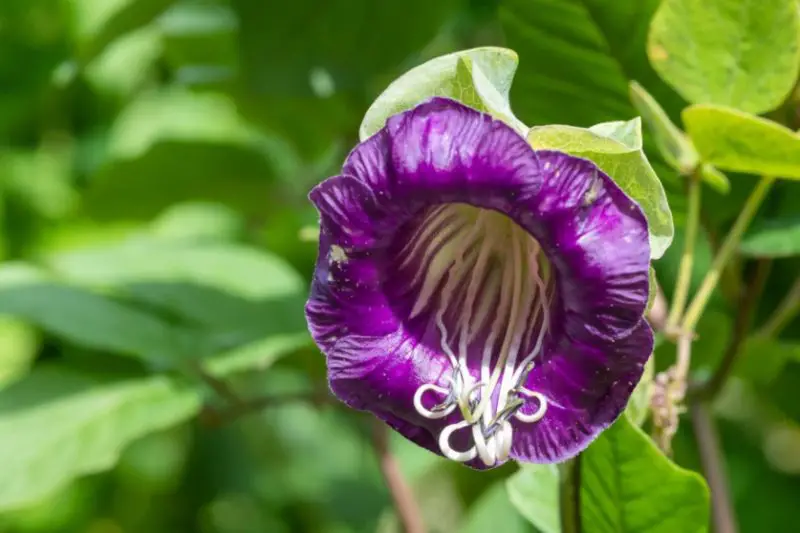
Cobaea scandens is a member of the Polemoniaceae family of plants and is sometimes referred to as Mexican ivy, cathedral bells, cup and saucer vine, and monastery bells. This blooming, perennial, climbing plant with hooked tendrils that cling to themselves is native to Mexico. The bell-shaped deep violet blossoms are clearly identifiable; each bloom is delicately cupped by a ruff, giving the impression of cups and saucers. There’s a musky smell to these blossoms.
Curcuma
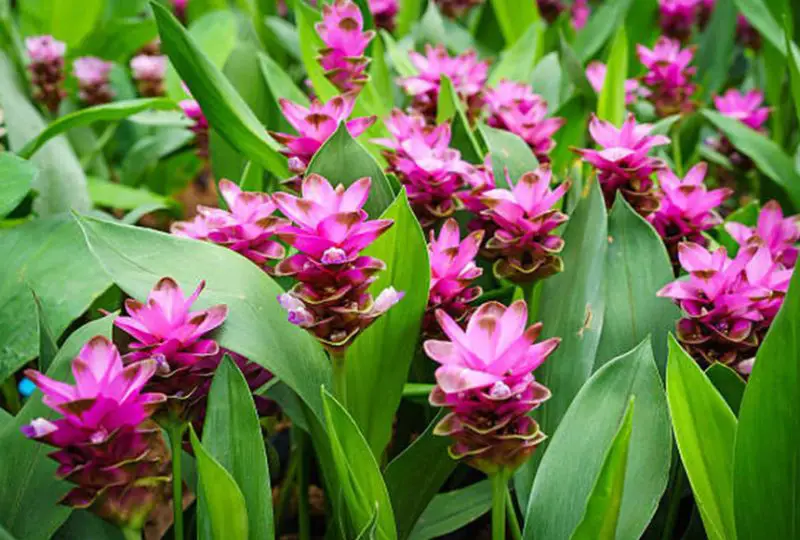
Curcuma, or Curcuma spp. in scientific parlance, is a native of Southeast Asia, New Guinea, India, and northern Australia. It belongs to the Zingiberaceae family of plants, which includes ginger. The 160 flowering plants in the Curcuma genus, sometimes known as turmeric or curcuma, bloom from summer to fall. These plants are widely grown for their aromatic, tuberous roots, which are frequently utilized in natural medicine and cookery.
Cyclamen
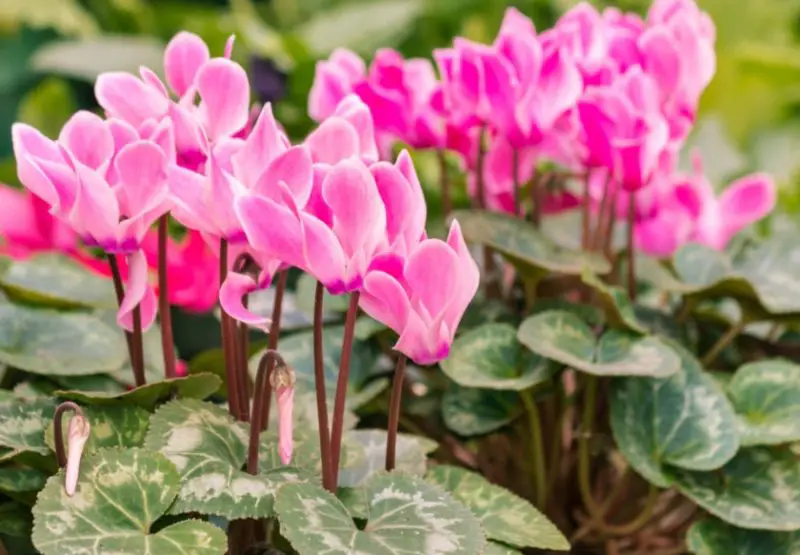
Scientifically referred to as Cyclamen spp., Cyclamen is a member of the Primulaceae family, which includes primrose plants. It is indigenous to Europe, the Caucasus, Iran, the Mediterranean region, and one species in Somalia. Cyclamen is extinct in Spain. The 24 recognized species of perennial flowers of the Cyclamen genus bloom from late fall to early April.
These plants produce rosettes of heart-shaped leaves that are frequently bordered in silvery white. Pink, white, red, and lavender blooms in the shape of shooting stars are produced by reddish stalks that jut out from the middle of the foliage.
Cymbidium Orchids
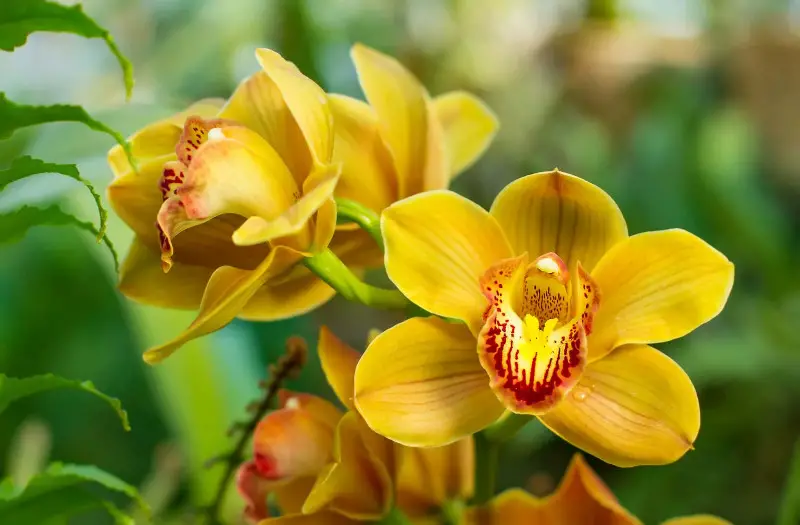
Scientifically referred to as Cymbidium spp., Cymbidium orchids are tropical and subtropical plants that bloom from fall to spring in Australia and Asia. This genus contains 86 species of plants, also known as cymbidiums or boat orchis.
Because of their plasticity, Cymbidium orchids can be found in a variety of settings as epiphytic, terrestrial, lithophytic, and even saprophytic forms. The orchids usually have white or green flowers, but they can also have deep purple and burnt amber flowers.
Cytisus
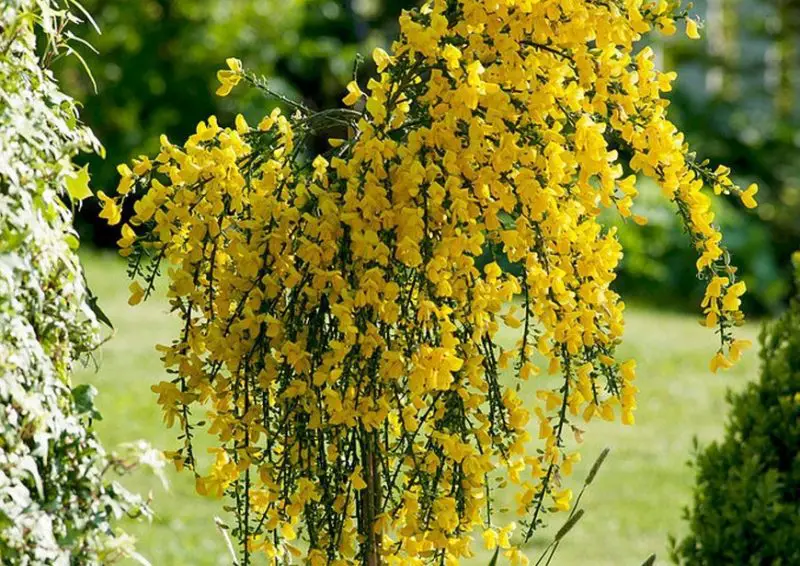
Cytisus, also referred to as Cytisus spp. in science, is a spring-blooming plant native to Europe, northern Africa, and western Asia that is a member of the Fabaceae family of plants. There are 29 species of flowering plants in this genus that are often called broom. When in bloom, these bushes provide copious amounts of fragrant, pea-shaped blooms that are usually bright yellow but can also have hints of orange and red.
Coneflower
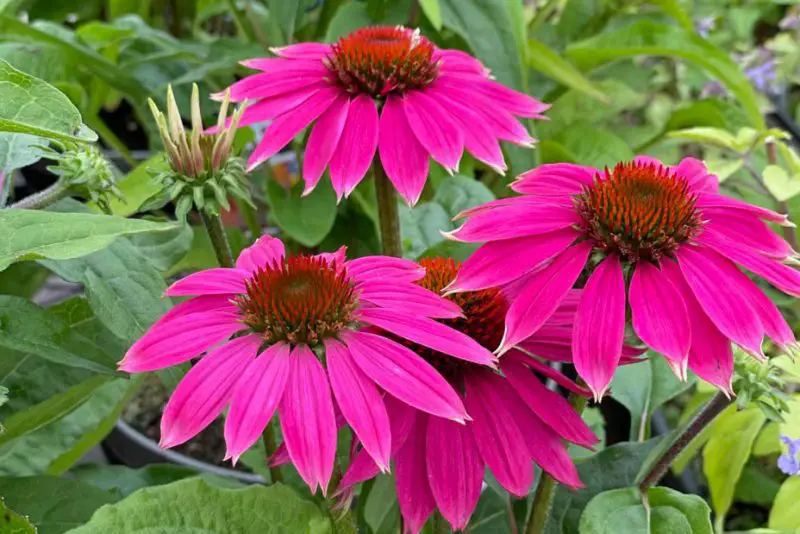
Coneflower, or Echinacea spp. in scientific parlance, is a native of the central and eastern United States and a member of the Asteraceae family of plants, which includes daisies. This genus, which includes nine recognized species of herbaceous flowering plants generally known as coneflowers, blooms from mid-spring until the first frost. Coneflowers are valued for their aesthetic qualities, but they are also used in herbal medicine because of their ability to strengthen the immune system and help fend off infections like colds.
Coral Bells
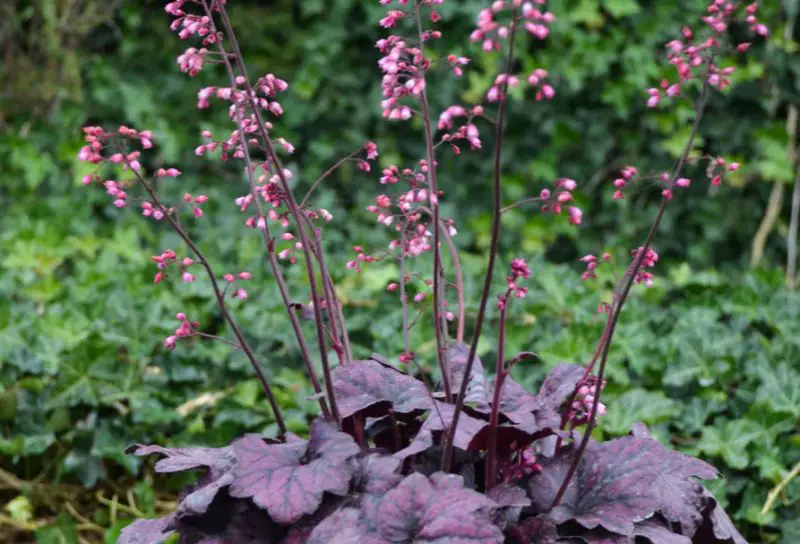
Scientifically referred to as Heuchera spp., coral bells are endemic to eastern Russia and North America and are members of the Saxifragaceae plant family. The Heuchera genus includes 44 recognized species of perennial, mainly evergreen, flowering plants that bloom from spring to early summer. These plants are also known as coral bells and alumroot.
These C-starting flowers are prized for their decorative use in gardens due to their eye-catching, vividly colored leaves and huge, spike-shaped flower racemes. The flowers are beautiful in a variety of hues and combinations, such as pink, red, yellow, blue, white, and purple.
Coral Honeysuckle
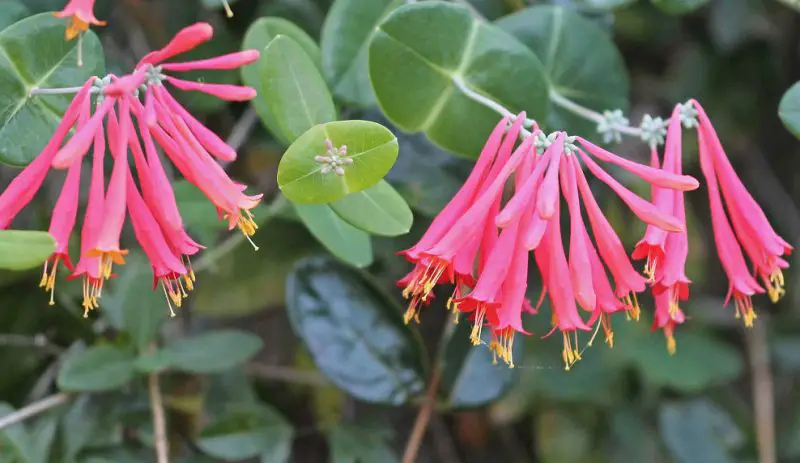
The scientific name for coral honeysuckle is Lonicera sempervirens, and it is indigenous to the eastern and south-central regions of the United States. It blooms in the middle to late spring. This vine, sometimes called trumpet honeysuckle or scarlet honeysuckle, gracefully twines over trees and shrubs, growing to a maximum length of 20 feet. Its oval-shaped, waxy leaves contrast with the vivid display of tiny, tubular blooms that range in hue from coral to crimson.
Corn Poppy
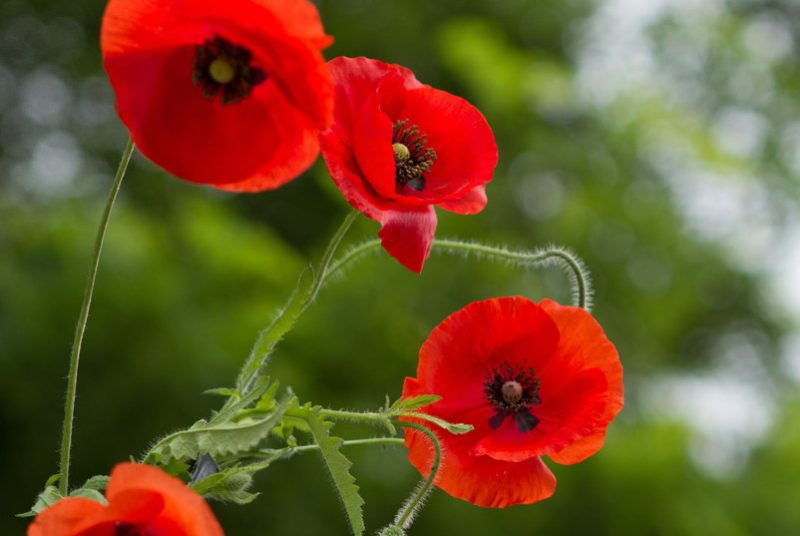
Papaver rhoeas, the scientific name for corn poppies, are endemic to western Asia, Northern Africa, and Europe. They bloom from late spring to fall. This beautiful plant, often called a red poppy, field poppy, Flanders poppy, or common poppy, has deep-black cores and scarlet-red blooms. Although commercially produced hybrids and cultivars display a variety of colors, including as pink, orange, yellow, and white, naturally occurring blossoms are always red.
Cornflower
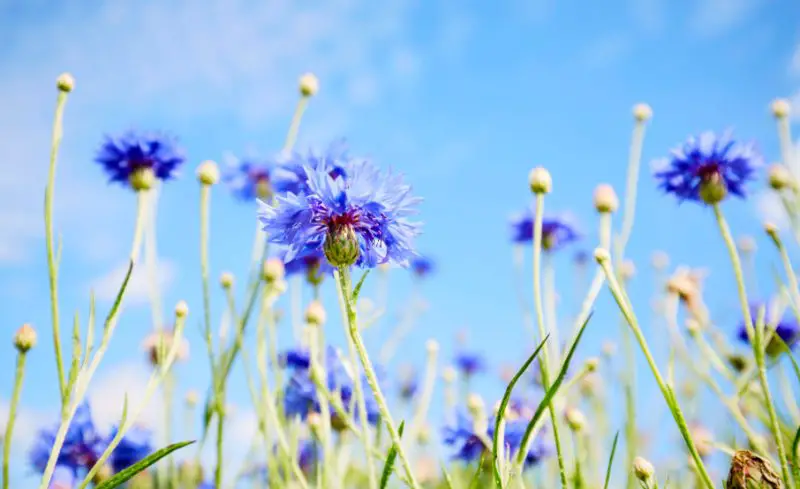
The Mediterranean region is the origin of the cornflower, or Centaurea cyanus as it is formally called. It blooms from late spring to July. Known by another name, bachelor’s buttons, these flowers are a mainstay of cottage gardens. They have a button-shaped spray of ray florets around a center of disc florets in the cornflower blue hue that gives the flower its name.
Cosmos
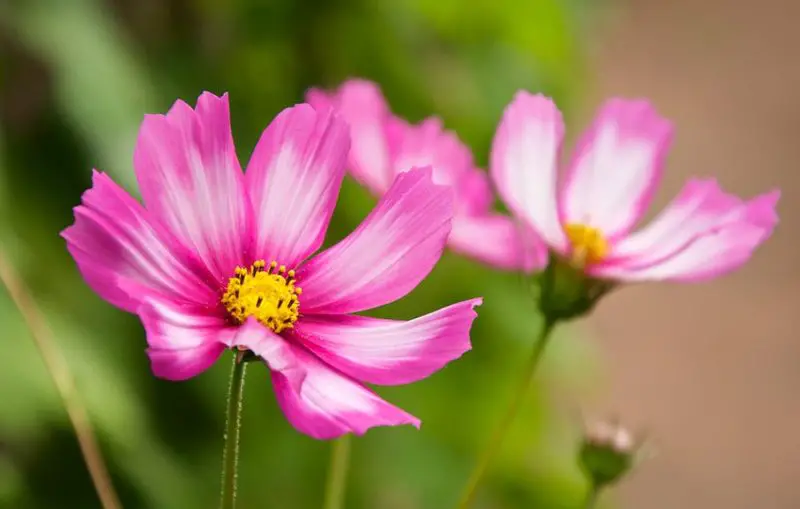
The natural regions of Cosmos bipinnatus, also referred to as Mexican asters or garden cosmos, include northern South America, Mexico, and the central United States. These C-starting flowers have brilliant yellow centers and bright colors of red, pink, and white in their symmetrical, cup-shaped blooms that bloom from summer to fall.
Cottage Pink
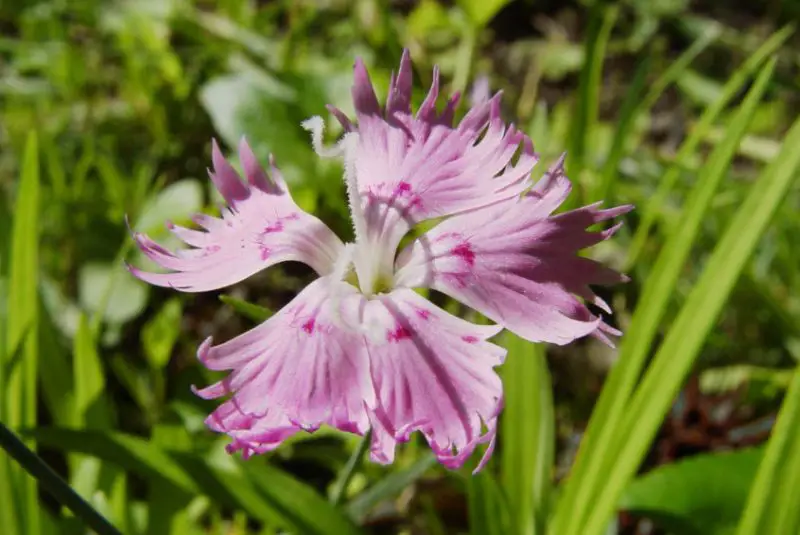
Dianthus plumarius is a member of the Caryophyllaceae (pink) plant family. It is sometimes referred to as cottage pink, wild pink, or just pink. These flowers, which are native to Hungary, Austria, Yugoslavia, and Italy, bloom from mid-spring to mid-summer. With thick leaves, they have clusters of red, pink, and white flowers with ruffled or fringed petals, and they smell very nice and spicy, like cloves.
Cowslip
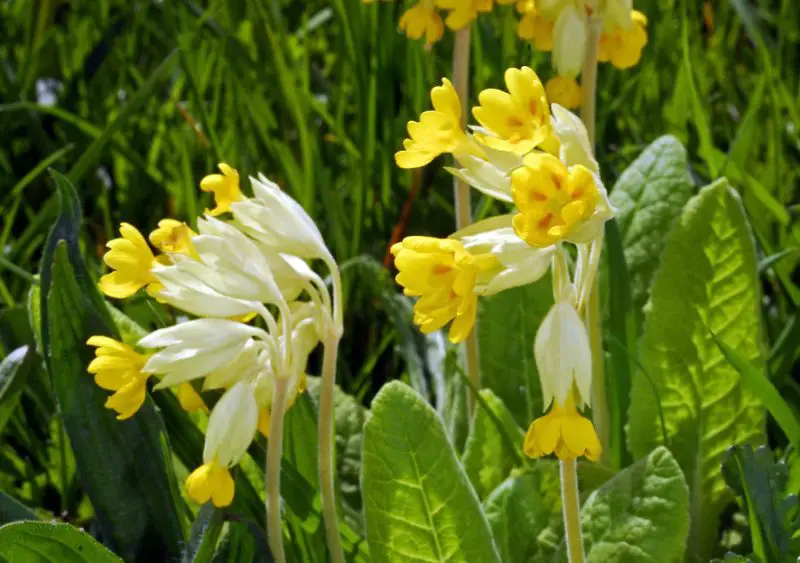
Primrose plants, or Primulaceae, include the cowslip, officially known as Primula veris. This plant family is native to central and western Asia, Europe, and Algeria, where it is now extinct. It blooms from mid- to late-spring, with a distinctive basal rosette of oval-shaped, green leaves and central stems that hold clusters of small, sunny-yellow flowers.
Crane Flower
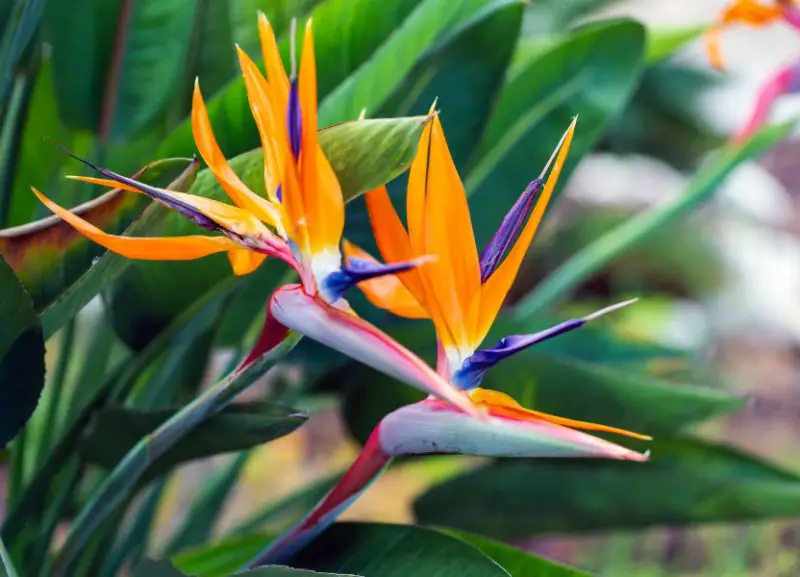
Originating in South Africa, the scientific name for the Crane Flower is Strelitzia reginae, and it blooms in the early spring. Also known as the “bird of paradise,” this plant is well-known around the world for its distinctive inflorescence, which resembles a brightly colored tropical bird. Crane flowers, with their tangerine sepals, electric-blue petals, crimson spathe, and green stems and foliage, are a symbol of independence and immortality.
Cranesbill
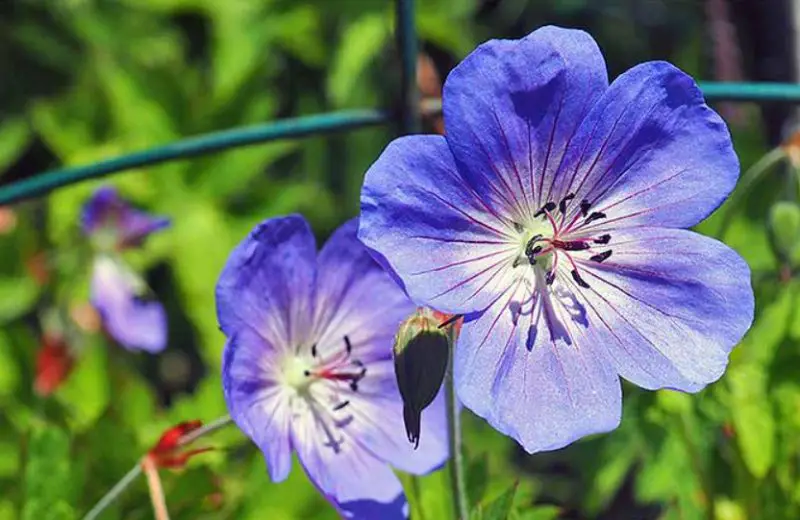
Scientifically referred to as Geranium spp., cranesbills are found around the world, primarily in the eastern Mediterranean. Within the Geraniaceae plant family, the Geranium genus has 361 recognized species of perennial, annual, and biennial plants that bloom from late spring until the first frost. These plants are frequently referred to as cranesbills.
Cranesbill blooms are normally composed of five petals and range in color from white to deep purple. Their growth habit of mounding and spreading makes them a great option for vibrant ground cover in gardens.
Creeping Phlox
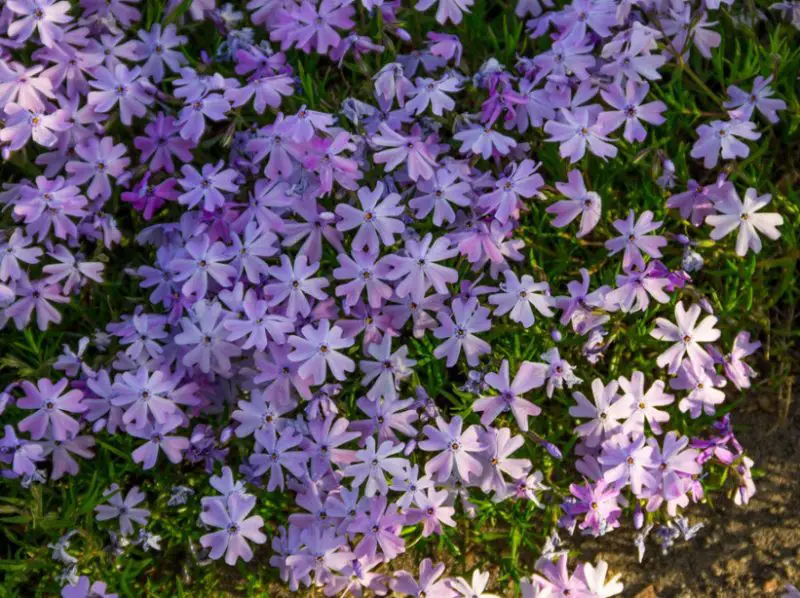
The formal name for creeping phlox is Phlox subulata, and it is endemic to eastern Canada and the eastern and central United States. It blooms in the middle to late spring. This plant, also known as moss phlox, mountain phlox, and moss pink, is a member of the Polemoniaceae family and grows in mats that provide vivid carpets of leaf when it blooms. These C-starting flowers come in pink, white, blue, rose, and mauve hues, and they usually have five petals.
Crocosmia
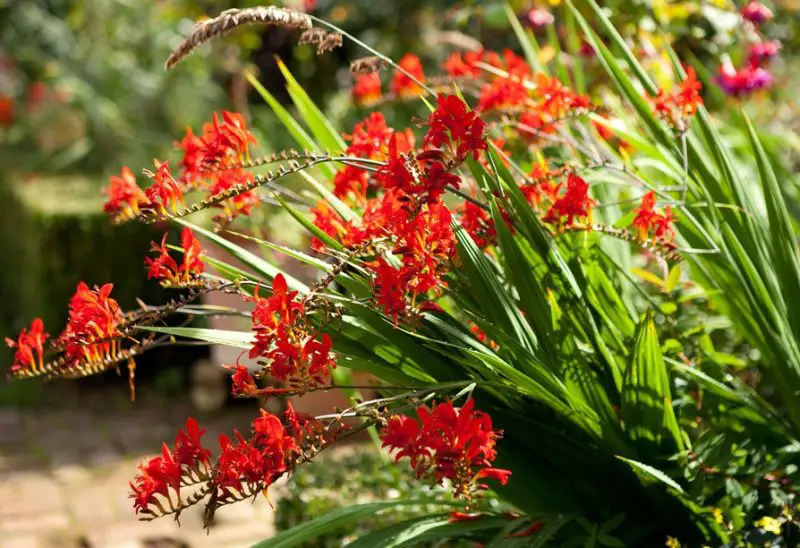
Originating in the eastern and southern grasslands of Africa, crocosmia, scientifically known as Crocosmia spp., blooms from July to midfall. The eight species of blooming perennials in the Crocosmia genus, which can be either deciduous or evergreen, belong to the Iridaceae (iris) plant family. The leaves emerge in vivid green, lance-shaped clusters, and the blooms, which resemble lilies, are colorful, with gradient shades of orange, red, coral, golden-yellow, and tangerine.
People Who Read This Also Read:


